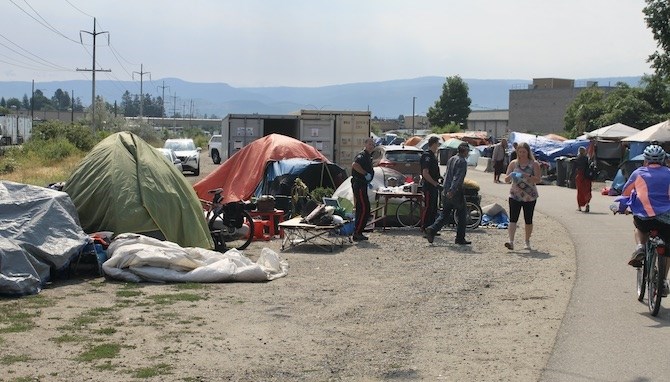
Every two weeks, groups of campers at the City of Kelowna's temporary outdoor sheltering space have to move all their belongings and let the cleaners in.
(ROB MUNRO / iNFOnews.ca)
July 12, 2023 - 7:00 AM
How would you like it if you were told to pack up all your worldly possessions and move them for a day every two weeks then set them all up again?
That’s what it’s like for the 120 or so people living in what the City of Kelowna calls its temporary outdoor sheltering site along the Okanagan Rail Trail.
“It’s a pain in the ass,” was the common response from residents when asked by iNFOnews.ca how they felt about being forced to move from one side of the rail trail to the other every two weeks so the place they camped in could be cleaned.
“For quite some time, the practice was daily decampment out there,” Kevin Mead, the city’s bylaw services manager, told iNFOnew.ca, July 11. “It’s quite evident, particularly in the western provinces and states, that homelessness is not decreasing. It’s in fact increasing for a whole host of reasons and Kelowna is no exception to that.
“We’ve seen an increase in numbers and in some cases an increase in the complexity of individuals that are relying on public space so we needed to adapt our methodology operationally as a response to that.
“Instead of decamping every day, we systematically and routinely ask portions of people using that space to pack up their stuff and move it just immediately adjacent to the site and/or use personal storage services that are out there so that we can come in and ensure the space itself is as sanitary and as clean as possible.”

This is where they had been camping.
(ROB MUNRO / iNFOnews.ca)
How well that’s being done is a matter of opinion.
“It would be one thing if they always did what they said they were going to do, which is to clean it and rake it and all that,” second-year resident Debbie Houghtaling told iNFOnews.ca. “But the last two moves, they didn’t do anything except move us over here and move us back. They picked up stuff but the other stuff we have to do ourselves.
Camp resident Ryan Valcourt said city crews drag a rake, like those used in baseball diamonds, over the area a couple of times, then leave the residents to to clean out the garbage that’s raked up and smooth the rocks for more comfortable camping.
He suggested a monthly cleanup.
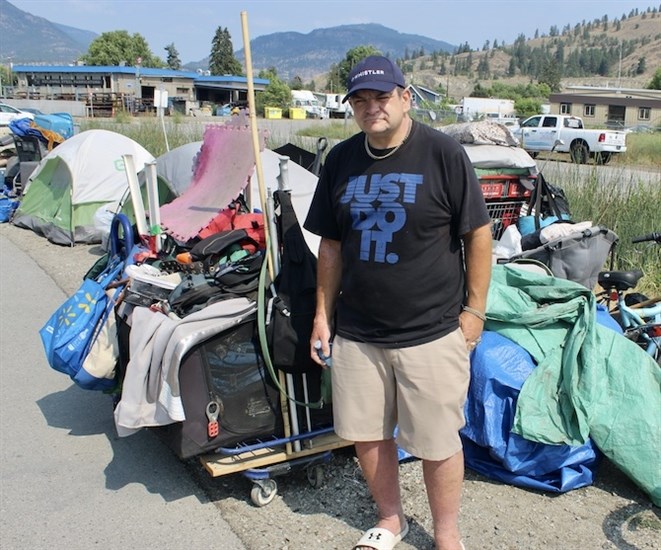
Ryan Valcourt.
(ROB MUNRO / iNFOnews.ca)
“It’s not going to be that bad,” Valcourt said. “Let every section have their own policing. We take care of our own. We don’t go to their house and tell them to move.”
Earlier this spring, federal Conservative leader Pierre Poilievre posted a video of the camping area and insinuated Kelowna looked like a third world country.
READ MORE: Poilievre’s negative comments about Kelowna 'poverty porn': homelessness expert
It showed possibly one of the cleanest camping sites anywhere as the camera slowly rolled along the 800 metre length of the tents along the rail trail east of Richter Street.
“On moving day you see the reality of it,” Houghtaling said. “A lot of people do their best to keep their areas looking good but some don’t do anything.”
She pointed to her assorted piles of possessions referring to them as a mess now, but she said she does her best to keep her area clean.
Being there for two years, Houghtaling has a lot of stuff, including winter and summer clothing.
“I’m already getting ready for the winter because I assume I’m going to be here another winter,” she said.
She grew up in Oliver but moved to Alberta. After her partner died she came back to the Okanagan three years ago and has been in the camp for two.
“How do you get a job when you live in tent city?” Houghtaling asked. “It’s very noisy here at night. It’s impossible to have any kind of stability. Then you got this (pointing to the chaos around her) on moving day. I can’t take two days off work – it’s essentially two days that you’re devoting to this.”
That’s most of one full day to move and have crews clean and another to try to restore some order back to her home.
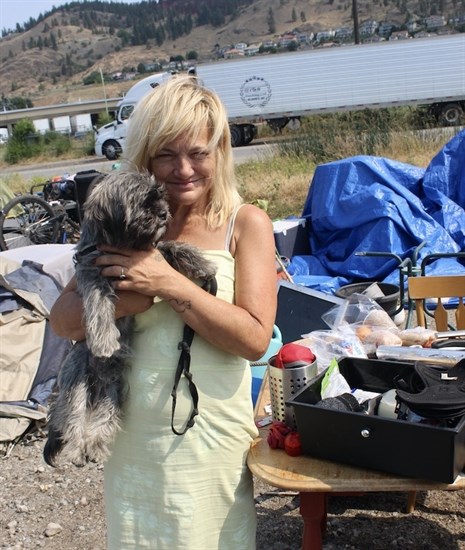
Debbie Houghtaling and Kismet.
(ROB MUNRO / iNFOnews.ca)
Then there’s Kismet, her dog, which doesn’t allow her to get into a shelter space.
“A lot of workers don’t like hearing about people having a pet,” Houghtaling said. “They said I can go in if I give him up. I’m not giving him up. He is my mental health.”
Tent city resident Valcourt spent a year at the site before getting a room in the Cardington supportive housing project three months ago but he did spend six years previous to that without a home. He had to leave his girlfriend behind so comes back to visit and help on moving day.
“I’d love to have her there (at Cardington)” he said. “She could have a shower. She could sleep.”
But it’s not allowed.
“Being outside for six years it’s a little harder to transition (to housing) than I thought,” Valcourt said. “I’m used to being outside and having my friends and family – I consider all my friends family.”
A fire, caused by a faulty electrical system on Jan. 4, 2018, destroyed the mobile home where he was living and he couldn’t earn enough to pay rent.
“The cost of living is atrocious,” Valcourt said. “It’s stupid.”
Valcourt is 46. He grew up in Kelowna and many of the friends he has at the tenting site he’s known for 20 years.
Both he and Houghtaling talked about how generally safe the site is.
“We all kind of stick together,” Houghtaling said. “The people that are here, it’s safe here. Absolutely it’s safe. The danger is from outside. People come in from the outside and make it unsafe for us. They accuse us of stealing and doing all kinds of things that none of us do.”
She sees at least 10 people a day taking photos and videos of the camp as others race along the rail trail at high speeds on e-bikes.
“People here are discriminated against,” Valcourt said. “You should see some of the looks of people coming through here. It’s really absurd that they look down on us because of the way we live.”
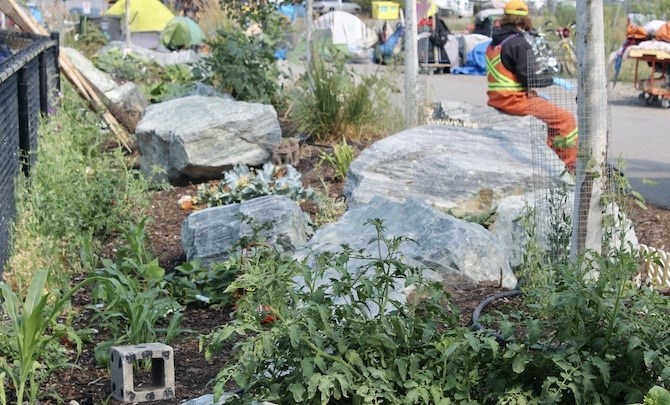
Debbie Houghtaling has created what she sees as a community garden with flowers and vegetables.
(ROB MUNRO / iNFOnews.ca)
Bylaw manager Mead pointed out the city has an obligation to provide space for people to shelter outdoors if there is not enough housing available for them.
The city set up its first outdoor camping area in November 2019 and broke up what was becoming a semi-permanent tent city on Leon Avenue near the Gospel Mission.
READ MORE: Shutdown of Kelowna homeless tent city catches campers by surprise
This current version of its outdoor sheltering site was opened in the spring of 2021 to accommodate 40 to 50 people. That number has more than doubled and given the high cost of housing is expected to continue to grow.
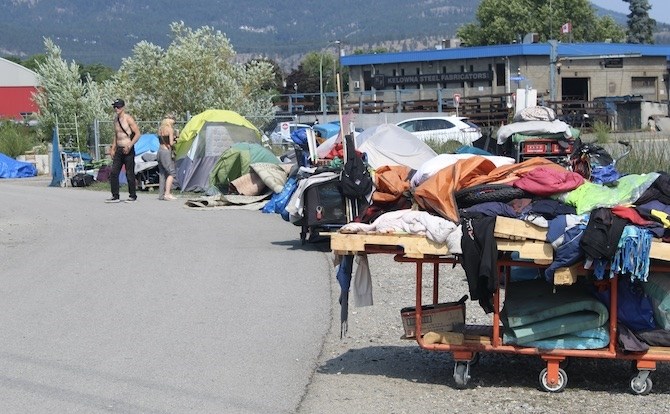
Part of the area forced to relocate to make way for the cleaning crews.
(ROB MUNRO / iNFOnews.ca)
Initially, people were still expected to pack up by 9 a.m. each day, store their possessions and not return until after 5 p.m. But the population of people needing shelter has outgrown the site so it’s been allowed to stretch about 800 metres along the rail trail, Mead said.
It’s divided into three zones so each gets the big move and cleanup once every two weeks.
“By virtue of allowing them more space and not compressing them into what is really a quite confining space, it allows a bit of equilibrium there,” Mead said. “You can imagine, if you put people in a pressure cooker, the chances are that there’s going to be some sort of discourse that is just going to increase.”
That’s not to say the area is without its problems.
Up to eight bylaw officers will visit the site each day, there’s evening security with the Commissionaires. RCMP officers drive by and respond to calls. Interior Health and other agencies have outreach workers attending regularly.
Numerous garbage containers throughout the site are emptied daily.
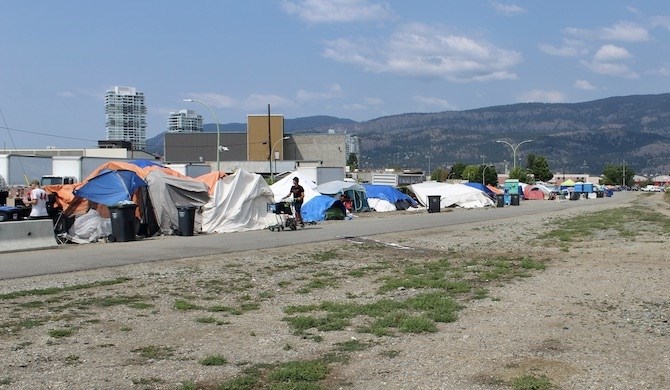
View of the encampment from the east end.
(ROB MUNRO / iNFOnews.ca)
Efforts are made to direct residents into shelters or housing when it becomes available.
“Really, we consider ourselves to be an extension of sheltering,” Mead said. “Whether that’s outdoor sheltering or indoor sheltering or supportive housing, it’s all about trying to get people out of homelessness in one way or another as best we can. And it’s super difficult work.”
There is a cost to all of this, an estimated $78,000 a month with about 55% coming from provincial government grants, Mead said.
That figure includes things like wages at the Metro Community centre that provides laundry, showers, storage and meals, along with other materials. Then there are wages for police and bylaw officers who work in other areas as well.
“If there’s one thing I want to emphasize, it’s the interdisciplinary and interagency team with which we’re all trying to serve the community,” Mead said. “This is community challenge which we’re all trying to undertake together.
“It’s not just not-for-profits and it’s not just enforcement and it’s not just the municipality or province that share responsibility in this. It’s all members of the public as well. That’s the only way we’re going to be able to serve each other as we go through this.”
To contact a reporter for this story, email Rob Munro or call 250-808-0143 or email the editor. You can also submit photos, videos or news tips to the newsroom and be entered to win a monthly prize draw.
We welcome your comments and opinions on our stories but play nice. We won't censor or delete comments unless they contain off-topic statements or links, unnecessary vulgarity, false facts, spam or obviously fake profiles. If you have any concerns about what you see in comments, email the editor in the link above. SUBSCRIBE to our awesome newsletter here.
News from © iNFOnews, 2023